January 23, 2015. 1 a.m., Mountains of Southern California.
I’m sitting on a cooler, sobbing.
For the first time, I’ve used my copywriting for evil.
I tricked someone. Someone important.
They believed everything I said. And now, in a classic be-careful-what-you-wish-for-type scenario, I’m paying for it.
Next to me is one of my best friends, a logger named Jesse.
Twenty feet in front of me a half-a-dozen drunk military veterans gathered around a fire, laughing and swapping war stories. Every time I hear a roar of laughter, I worry they’re talking about me.
Directly behind me is the kind of tent you see in war movies filled with canvas cots. I can hear the other 10 (all male) vets snoring inside. These guys are sleeping soundly even while the tent whips in the wind around them — confident they’re in the right place. That’s what my mind is telling me, anyway.
To my right two 1-man tents. In one is Vince, the Director of Operations of Team Rubicon. In the other, Jason, the Director of Training. The two men who I’m convinced are going to put me on a plane and send me home within the next 24 hours. I stare at their tents and imagine what’s going on inside. They each must be lying awake, trying to figure out the best way to break the news to me. Sorry, Abbey. We like you… but you don’t belong here.
They had to have seen it. Every one of the people around me had to have seen it. I shouldn’t be in this group. I’d weaseled my way in and now been found out for sure.
This is the first cadre of chainsaw instructors ever in Team Rubicon, a fairly new and revolutionary disaster response organization. Team Rubicon’s mission is simple but profound — take the skills of military veterans and first responders and use them to serve in the wake of hurricanes, tornadoes, and floods domestically and around the world.
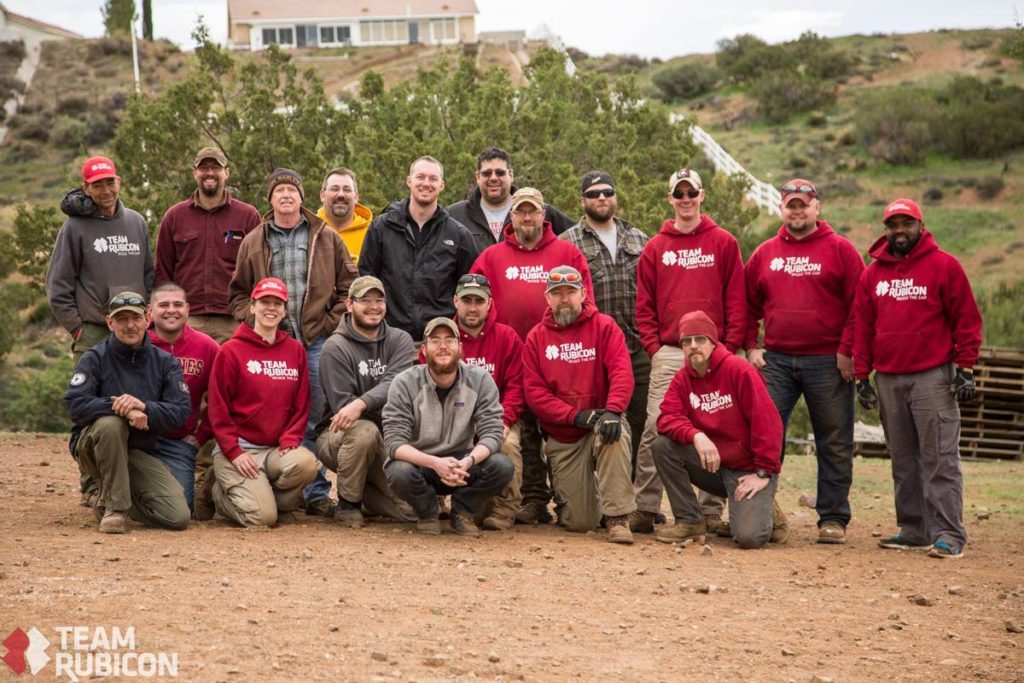
The first cadre of Team Rubicon chainsaw instructors. California, January 2015
On this day, our group is camping together on a mountain with a simple goal — to make history. In the form of chainsaw instruction. The 20 of us have been chosen to write and execute the new chainsaw operations curriculum. We’re forming the foundation for a program that will be used in one form or another until the end of time.
We’re directly responsible for changing the disaster landscape by creating the ability to help victims of disasters on their worst day, in the coolest way possible. Our future students will show up in a hurricane-ravaged neighborhood, chainsaw in hand, ready to clear trees from property, roads, and houses. We’re also protecting lives. We’re teaching our eager volunteer base how to be effective and safe. To channel their desire to serve into a very specific and very needed skill set. No other disaster response organization has a program quite like this.
Every person who picks up a chainsaw stamped with the Team Rubicon logo from now until forever is in our hands. It’s big stuff. We all feel the weight of that. And no one more than me.
Among the group are combat veterans, search and rescue specialists, loggers, arborists, wildland firefighters, paramedics, a British paratrooper, and a sawyer climbing specialist (yes, a guy that uses a rope to climb a tree with a running chainsaw on his back). These are some of the bravest men with the most insane experiences I’ve ever heard.
Then there’s me. This girl. This civilian. This… copywriter?
And I’m crying on the cooler.
I’m way out of my league.
In the internet marketing world, “application only” means “show you’re committed by taking 5 minutes with this form and you’re in.” Not here. The best sawyers in the organization applied — some who were pumped to be involved and some were pumped for the bragging rights that came with involvement.
Now, I’d been 100% honest in my application — I was a proficient but not experienced sawyer. And I was a good teacher and passionate about the opportunity to be involved. I thought about every single word on that application, and used all the persuasion tactics I learned in my copywriting career. I included the hopes, fears, and dreams of the training department, highlighted my strengths, and answered common objections. While those other guys provided straightforward answers to the questions, I had to sell.
And it worked. I was ecstatic (and surprised) when I got this email:
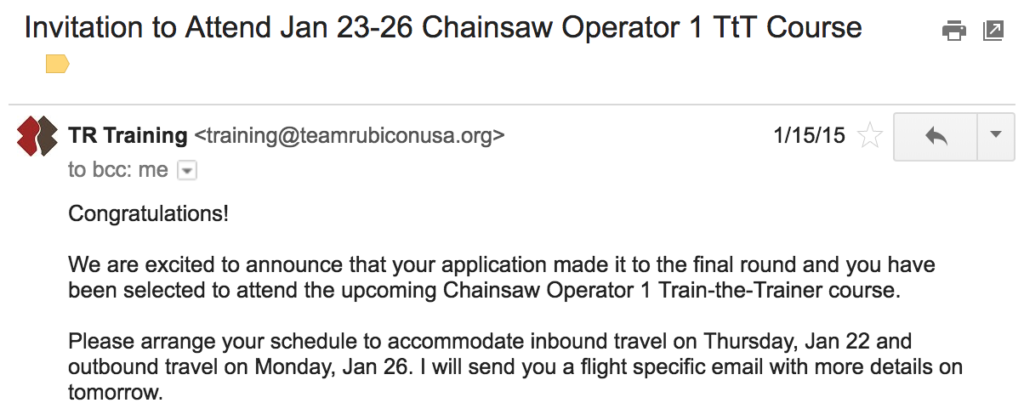
January 23 comes. Day 1. We debate everything. Or rather, they debate everything. The merits of a reduced-kickback chain. Whether the ground-start or 3-point start is better for beginners. Which type of tourniquet should be packed in the med kits. How to refer to that one part — is it “bumper spikes” or “felling dogs?” If a composite or steel toe should be required.
And that’s just the classroom. At lunch it’s whether or not Husqvarna is superior to Stihl. How many saws they own. The craziest, biggest, gnarliest trees they’d worked on. I have nothing to say. Nothing to contribute. I don’t even own a chainsaw. I have no near-death stories involving trees. And I can’t look at a saw and immediately tell whether it has a reduced-kickback or a standard chain.
That first day, my hands shake every time I pick up the chainsaw. And some of them notice. And even if they don’t, I notice. Each time I make a mistake, I scan their faces for subtle signs — eye rolls, grimaces, snickers — and I manage to find them. Every. Single. Time.
So that night, certain that everyone knows I’m a fraud, I drink. A lot. I’m going to prove myself one way or another, and that bottle of Jameson Whiskey is just the ticket. Surprisingly, this doesn’t quell the voices in my head. And at 1a.m., I lose it. I confess everything to Jesse. The application, my skills in persuasion, my guilt for being there, my embarrassment.
The wrong room
There’s this horribly overused phrase “if you’re the smartest person in the room, you’re in the wrong room.”
And it’s true. In order to grow, we need to push ourselves… to get into rooms with people that have different experiences. And it’s not just about people that are smarter. It’s about showing up in rooms where you’re the only one like you… the only woman, the only person with your background, the only one from your town (or country).
What they don’t tell you is when you get in the “right” room, it feels wrong. More than that, it flat out sucks. And it’s scary. And it makes you feel so very alone.
Some of those feelings come from inside– from your own insecurities and fears. And some will come from them— those people that look at you and wonder how you got there. Why you don’t look or act like everyone else.
Here’s where we have a choice. You can blame them and try to change the system by demanding they put more people like you in the room. And some will agree. And some will not. And some will keep throwing obstacles in your way, convinced that you and people like you in that room means they may lose their place.
I’d like to say that my breakdown in the California mountains resulted in Jesse going back to the group and rallying them around me. With a big group hug. With all 20 of these men expressing joy that I’m waving the diversity flag and encouraging women to rise up, lean in, and embrace equality.
And of course I have support. I’d even say that the majority of those men are on my side. And lord knows, Jesse tries to convince me that it will all be ok.
But turns out, it’s not ok. I have to work hard. I have to learn fast. But it never feels like enough. I can’t shake the feeling that I don’t belong. I look around and see faces that don’t look like mine. The faces of warriors.
So I find myself faced with a choice — listen to those that say I don’t belong or prove them wrong. I become a warrior, too.
I work harder, longer, and smarter than anyone.
Find an advocate
The next year ends up being the most trying of my life. I have to prove myself every time I walk into a room. Every time I pick up a chainsaw. Sometimes to others. Sometimes to myself. I have to stand in front of people who are more qualified, more experienced… and teach. I have to learn to adjust my approach knowing that I’m going to be questioned more.
I have dozens of calls with leadership addressing my right to be there. I work longer hours, fight more battles, and prepare more than any other chainsaw instructor. I buy a chainsaw, practice my skills, and work with Jesse almost daily by calling him with questions, texting photos of felled trees to analyze, and travelling across the country to cut every tree they’ll let me.
But the thing is, it’s not Jesse’s battle to fight. And he can’t win it for me.
I do everything I can possibly think of to prove myself. To stop the questions both coming from the mouths of my co-instructors and from in my own head. Good is not good enough. I have to be the best.
Take the bullets
In June of 2015, I’m asked to teach the first field certification class in the history of the organization. On my own.
On my way there, during a layover in Chicago, my phone rings. It’s one of the guys who had seen me sitting on the cooler six months earlier. I smile hoping for some words of encouragement. Instead I hear:
Abbey, I just want to let you know that I and a few other guys have been talking. We have zero confidence in your ability to teach this. We are petitioning the organization to stop chainsaw use on this operation while you’re there. Just thought you should know.
Those words echo as the flight lands. And they come up again just before I teach the class. Because he keeps saying them… to anyone who will listen. But despite his relentless attempts, I become the first to certify chainsaw operators directly in the field. 19 of them. They go on to serve the community of Wimberley, Texas. National Operations, Training, and Leadership teams are thrilled as we usher in a new era of disaster response.
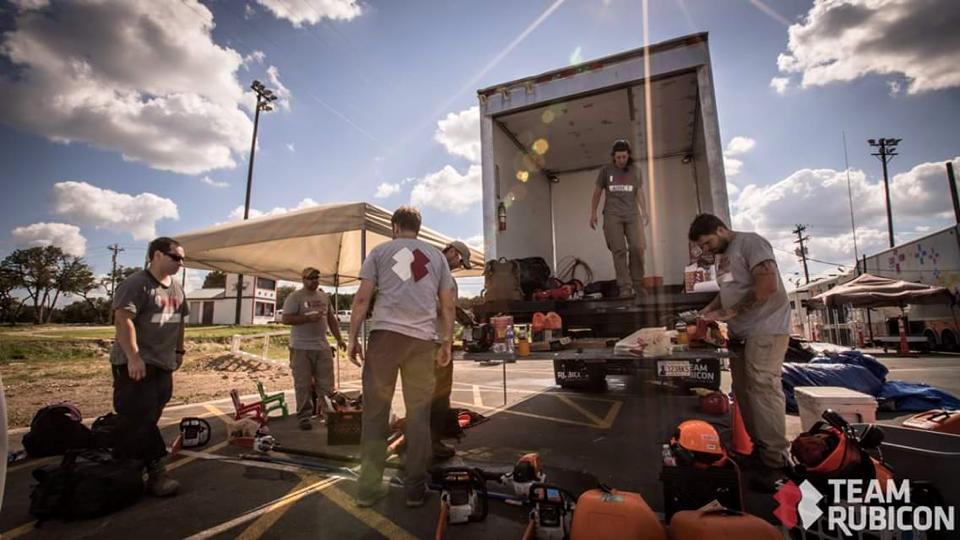
Wimberley, Texas June 2015
But I don’t stop. I go home and write the manual on how to best run a field certification class. And I keep teaching. I fly from Omaha, Nebraska, to Fort Collins, Colorado to Newton, New Jersey to cut more trees, teach more classes. Of the first 100 or so sawyers to be knighted by Team Rubicon, I’m directly involved with around 60 of them.
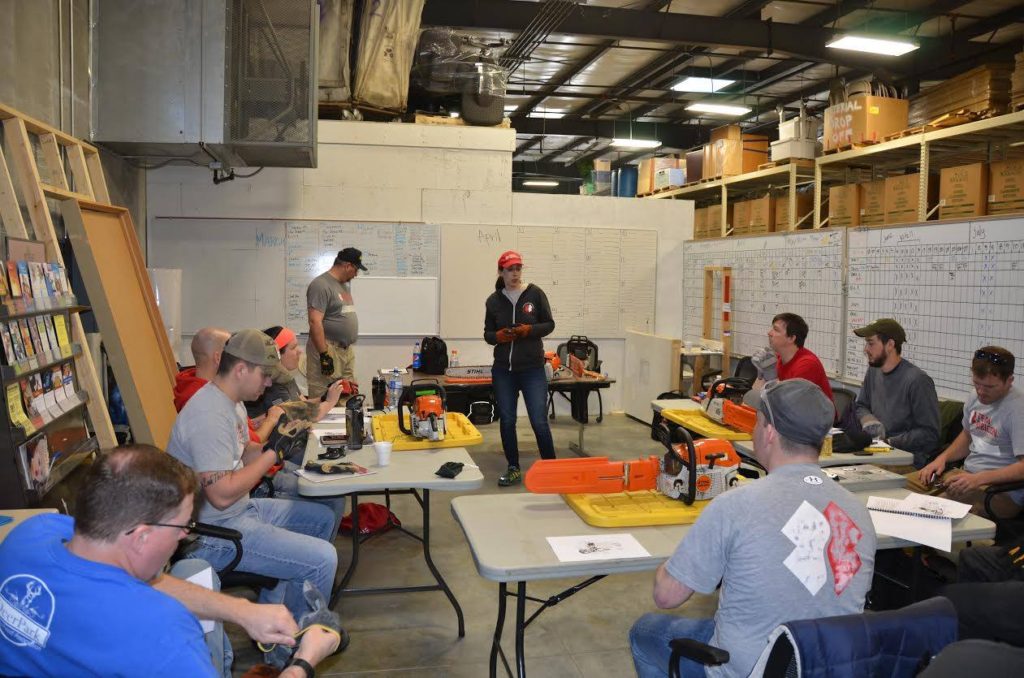
Teaching a class in Omaha, Nebraska
“Run point” for the rest
Finally, in June of 2016, I personally train Bekah, the second female chainsaw instructor. And now, there’s a half-a-dozen women throughout the country teaching classes and hundreds running saws. They don’t have to fight anymore. Because I took those bullets. I have the scars.
There’s a lot of talk in copywriting and other industries about encouraging diversity and inclusiveness. But what I’ve found is that there’s not much talk about how that actually happens. When you look back in history in various industries, you’ll see stories that mirror my chainsaw story. Stories about the first. The ones that felt like they were different, like they didn’t belong.
When you’re running point — a term I learned from those military veterans on that mountain — you’re the first in the patrol, the one that walks into the unknown. And for me, that meant taking the enemy fire and finding the path that the women of Team Rubicon that came behind me could follow.
That’s the way it happens. You can’t wait for someone else to fight your battle, or for the enemy to stop firing, or for the war to stop. The only thing to do is to step forward, take real action, and lead the charge. You have to walk out blindly and take the fire to protect those behind you. And it sucks. And it’s hard. And it tests you. And makes you cry on a cooler in the mountains.
Look, I’m not stronger than other people. There’s some battles in my life I couldn’t fight… or chose not to. For a thousand different reasons.
We all have to decide. If there’s a cause you want to advance there’s no easy way to do it. You have to take the fire. Everyone has their own battle to fight. No one will fight yours for you. Only you can do that.
Because the thing about glass ceilings is that there’s only one way to break through them. Brace for impact and get ready to bleed.
And holy shit, those cuts will hurt. But they will make you stronger.
There’s always going to be something to hold you back. The way you look. Your gender. Where you’re from. Your experience. We all have our obstacles. And that can be limiting or it can be a source of incredible strength. By struggling through those battles and overcoming those obstacles, you’ll earn scars and learn lessons that others won’t have to. And in the process you’ll get stronger, fight harder, and be better.
And then no one can question you.

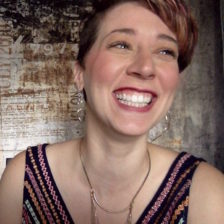
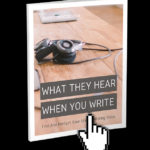
Great article, Abbey. Honest, with some very important lessons.
Thanks for sharing your story.
“Fast and Rugged” was my Army Engineer unit’s motto.
There are leaders and then there are those who lead. We follow those who lead, not for them, but for ourselves. No slack, Abbey. You’re a leader, and you earn respect with everything you do.
Keep up the good work in the “internet marketing community” and in “real life”
What a great story. Clearly illustrates glass ceilings aren’t just about gender. Nice job, Abbey.
What an empowering story… We’ve all felt the impostor syndrome at one time or another and you nailed the description.
Thanks for sharing your authenticity and vulnerability, Abbey!
Abbey, what a tremendous story! And you tell it so beautifully! A needed reminder for me that believing in yourself isn’t always fun, but it’s always worth it in the end. Thanks.
This made me all mushy on the inside, Abbey.
In a world that’s constantly screaming about outcomes not being “fair” and for more “inclusiveness”, you’re a tremendous example of what’s possible when you don’t give a fuck and focus on making your own vision for the future a reality.
I tip my hat to you!
PS – Who said schemas were a bad thing??!
Thanks Abby. I appreciate the reminder that when we step into that new room, we will feel uncomfortable and out of place. We get to choose how we react to that and how we deal with it.
Great story and great message. Thank you for sharing it.
Wow. Nailed it. I wish I had read this before I walked into that meeting in Connecticut. I could have used the extra starch in my shorts this provides. But like you, I still knew and had the scars to show for it.
This is brilliant, gripping, and poignant. Helps me understand with more insight why I admire you so much!!
Cyndee, you are a beautiful person and this is a beautiful comment. All of us in Connecticut had (and still have) your back!